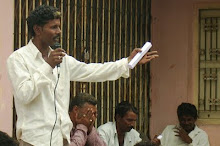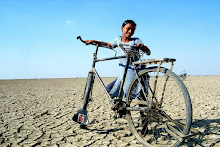Vijaysinh Parmar TNN
Bhavnagar: Small and marginal saltpan workers in Rajula taluka of Amreli district, often known to be debt-ridden and poverty stricken, will now be armed with science and technology to help them earn more and break away these vicious debt traps. Central Salt and Marine Chemicals Research Institute (CSMCRI) here has been awarded Rs 1.80 crore grant by the state industries department for ‘saltpan cluster development programme’ to train these workers to produce better quality salt to earn better profits. CSMCRI scientists will improve quality and yield of salt produced from sea brines (sea water) by marginal agarias (salt pans) of Rajula through technology upgradation and improving their income through value addition of bittern (the liquid pumped off after the salt is harvested from the brine). This will be done in association with Agaria Heet Rakshak Manch (AHRM) of Ahmedabad who are their project partners. CSMCRI director Dr PK Ghosh said, “In the first phase, we will train marginal salt pans of the region by imparting in-house as well as field training programmes to increase yield and improve quality of salt. “In the second phase, our aim is to ensure that the technology is translated to grassroot level for tangible benefits,” he added. This will be done by cluster development. “Along with AHRM, we have already started forming a cluster of 150 salt works of Rajula,” he said. Explaining the process, Dr VP Mohandas, scientist at CSMCRI, said, “At first, we will adopt certain pans for conversion to model units for demonstration. Then quality control laboratory equipped with basic requirements for the characterisation of salt and brine sample will be established.” With this training, a saltpan will be able to classify various brines in terms of their potential vis-à-vis yield and quality of salt. Workers will be able to get premium prices by selling global quality salt. “Our estimate is that with this project, workers will be able to earn about four times more and improve their living standards,” Mohandas added. In addition to salt, which is currently the only product sold, the project aims at training workers to add value to their bittern by processing and recovery of valuable marine chemicals like low sodium salt and potash. These will add to their income. ‘Earlier experiences have been encouraging’ The Rajula salt water cluster development project will be the third such project to be undertaken by scientists of Central Salt and Marine Chemicals Research Institute (CSMCRI) in Bhavnagar. “Our earlier experiences of the same cluster development projects with two organisations, Self Employed Women’s Association (SEWA) in Little Rann of Kutch (LRK) and ANANDI, an NGO, in Maliya taluka of Rajkot district, have been encouraging,” said one of the members of the project team at CSMCRI AM Bhatt. The marginal salt producers of LRK region (1–2 acre area) were fully trained to produce high quality industrial grade salt from subsoil brines and market their salt directly to user industries at a premium price. “Today, these agarias are producing good quality salt on scientific lines. The programme that started with 30 marginal salt works went on to work with 110 by the second year. Now, SEWA has formed a co-operative of salt workers with 1,000 members,” said Bhatt. The co-operative runs 100 marginal salt works by providing revolving funds. “The agarias were shown the processing of bittern for recovery of potash rich carnallite. This same model will be replicated in Rajula,” he added.
Bhavnagar: Small and marginal saltpan workers in Rajula taluka of Amreli district, often known to be debt-ridden and poverty stricken, will now be armed with science and technology to help them earn more and break away these vicious debt traps. Central Salt and Marine Chemicals Research Institute (CSMCRI) here has been awarded Rs 1.80 crore grant by the state industries department for ‘saltpan cluster development programme’ to train these workers to produce better quality salt to earn better profits. CSMCRI scientists will improve quality and yield of salt produced from sea brines (sea water) by marginal agarias (salt pans) of Rajula through technology upgradation and improving their income through value addition of bittern (the liquid pumped off after the salt is harvested from the brine). This will be done in association with Agaria Heet Rakshak Manch (AHRM) of Ahmedabad who are their project partners. CSMCRI director Dr PK Ghosh said, “In the first phase, we will train marginal salt pans of the region by imparting in-house as well as field training programmes to increase yield and improve quality of salt. “In the second phase, our aim is to ensure that the technology is translated to grassroot level for tangible benefits,” he added. This will be done by cluster development. “Along with AHRM, we have already started forming a cluster of 150 salt works of Rajula,” he said. Explaining the process, Dr VP Mohandas, scientist at CSMCRI, said, “At first, we will adopt certain pans for conversion to model units for demonstration. Then quality control laboratory equipped with basic requirements for the characterisation of salt and brine sample will be established.” With this training, a saltpan will be able to classify various brines in terms of their potential vis-à-vis yield and quality of salt. Workers will be able to get premium prices by selling global quality salt. “Our estimate is that with this project, workers will be able to earn about four times more and improve their living standards,” Mohandas added. In addition to salt, which is currently the only product sold, the project aims at training workers to add value to their bittern by processing and recovery of valuable marine chemicals like low sodium salt and potash. These will add to their income. ‘Earlier experiences have been encouraging’ The Rajula salt water cluster development project will be the third such project to be undertaken by scientists of Central Salt and Marine Chemicals Research Institute (CSMCRI) in Bhavnagar. “Our earlier experiences of the same cluster development projects with two organisations, Self Employed Women’s Association (SEWA) in Little Rann of Kutch (LRK) and ANANDI, an NGO, in Maliya taluka of Rajkot district, have been encouraging,” said one of the members of the project team at CSMCRI AM Bhatt. The marginal salt producers of LRK region (1–2 acre area) were fully trained to produce high quality industrial grade salt from subsoil brines and market their salt directly to user industries at a premium price. “Today, these agarias are producing good quality salt on scientific lines. The programme that started with 30 marginal salt works went on to work with 110 by the second year. Now, SEWA has formed a co-operative of salt workers with 1,000 members,” said Bhatt. The co-operative runs 100 marginal salt works by providing revolving funds. “The agarias were shown the processing of bittern for recovery of potash rich carnallite. This same model will be replicated in Rajula,” he added.
















.jpg)
.jpg)
.jpg)
.jpg)













No comments:
Post a Comment